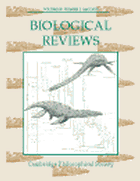|
Literature / Source Database:
Biological Reviews
Description
Published on behalf of the Cambridge Philosophical Society
| Title (short) |
Biol. Rev. |
| Languages |
English |
| First year |
1998 |
| Impact factor |
8.755 |
| Editor |
William Foster |
|
|

|
Status
active
Indexing
Academic Search (EBSCO)
Academic Search Elite (EBSCO)
Academic Search Premier (EBSCO)
AgBiotech News and Information (AgBiotech)
AGRICOLA Database (National Agricultural Library)
ASFA: Aquatic Sciences & Fisheries Abstracts (CSA/CIG)
BIOBASE (Elsevier)
BIOSIS Previews® (Thomson ISI)
CAB Abstracts
CAB HEALTH (CABI)
CABDirect (CABI)
CAS: Chemical Abstracts Service (CAS)
CSA Animal Behavior Abstracts (CSA/CIG)
CSA Biological Sciences Database (CSA/CIG)
CSA Environmental Sciences & Pollution Management Database (CSA/CIG)
Current Abstracts (EBSCO)
Current Contents® (Thomson ISI)
Current Contents®/Agriculture, Biology & Environmental Sciences (Thomson ISI)
Ecology Abstracts (Elsevier)
EMBASE/Excerpta Medica (Elsevier)
Embiology (Elsevier)
Expanded Academic ASAP (Thomson Gale)
GeoRef
Index Medicus/MEDLINE (NLM)
Index Veterinarius (CABI)
InfoTrac
Irrigation and Drainage Abstracts
Journal Citation Reports/Science Edition (Thomson ISI)
ProtoZoological Abstracts (Elsevier)
Reaction Citation Index™ (Thomson ISI)
Science Citation Index Expanded (also known as SciSearch®)
Science Citation Index® (Thomson ISI)
SCOPUS (Elsevier)
Soil & Fertilizer Abstracts (CABI)
Student Resource Center College (w/ Academic ASAP)
Zoological Record™ (Thomson ISI)
Predecessor
Biological reviews of the Cambridge Philosophical Society
Subject

Source type
Journal
Publisher
ISBN ISSN
1464-7931; 0006-3231
E ISSN
1469-185X
First volume
1
Last volume
85+
Publish city
Oxford
Homepage
| Resources |
|
Availability |
|
|
|
|
|
| Text PDF |
 |
free access |
 |
| Text Html |
 |
for subscriber |
 |
| References |
 |
not available |
 |
| Abstracts |
 |
|
|
| TOC |
 |
|
|
|
|
|
|

Description
Biological Reviews covers the entire range of the biological sciences, presenting several review articles per issue. Although scholarly and with extensive bibliographies, the articles are aimed at non-specialist biologists as well as researchers in the field. Authors are specifically instructed to be aware of this fact in their writing, and the resulting reviews serve as extensive introductions to particular fields, defining the state of the art, and drawing attention to gaps in knowledge. Articles are up to 20,000 words long and each contains an abstract, a thorough introduction and statement of conclusions. What Biological Reviews has to offer: - Fast publication times
- Flexible policy on nature of articles, with scope for extensive tables and illustrations
- International exposure with global circulation
|